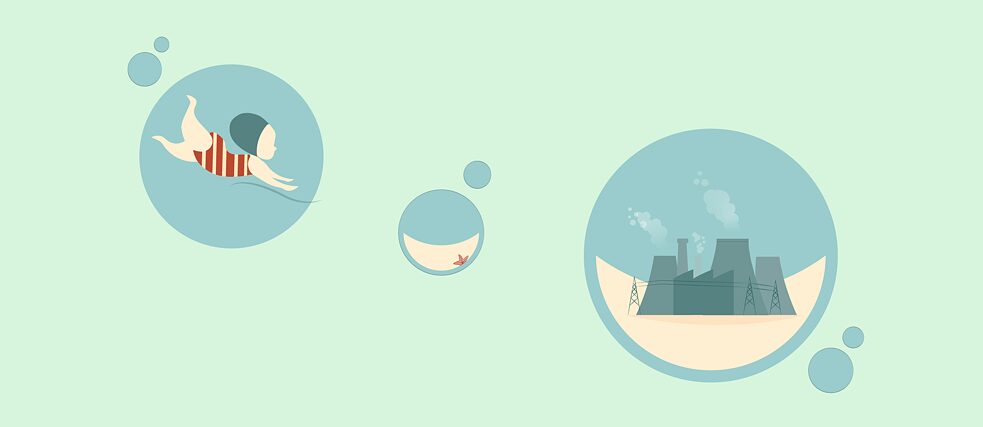Sustainable Economy and the Climate Crisis
Ipsos custodes: How can We Attain Greater Corporate Responsibility

© Goethe-Institut Italy | Illustration: Caterina Laneri
It is a beautiful summer morning on the coast of Tuscany. Young and old have set off by car at dawn in the air still damp from the night’s dew to get the best spot on the beach. Hundreds of them form a teeming throng around noon in colourful swimwear, with cool bags full of drinks and sandwiches, and spread out their towels on the only beach in Italy that offers this Caribbean combination of white sand and turquoise-blue water. Directly behind them, a forest of chimneys and smokestacks blocks the view of the sky.
By Gabriele Magro
The law as an alibi
The Solvay chemical plant in Rosignano has for a century now been dumping industrial waste onto the surrounding beaches and into the sea. It is no secret that soda powder is the reason why the sand and the seabed are so white. The representatives of the Belgian chemical company are nonetheless absolutely certain that the stretch of strand is suitable for bathing. Despite the 1999 United Nations report calling the beach "one of the 15 most polluted coastal areas in the Mediterranean;" despite the 2014 ARPAT report which addresses mercury levels in the sand; despite the 2018 parliamentary question (page 101), underscoring "the pollution of soil and groundwater by arsenic, chromium and other heavy metals;" despite ... this is where I stop because I have a word limit for this article, but I could continue the list ad infinitum.Despite all this, Solvay maintains that it is acting in accordance with the law. And that is the truth.
Upper hand
In 2003, scandals forced Solvay, which at the time was dumping some 200 tonnes of suspended solids a year into the sea, to agree to a contract for 60 tonnes. After signing the contract, Solvay continued to pollute the environment as if nothing had happened. If the mountain won't go to Mohammed, then the Ministry of the Environment will just have to come to the mountain. The 2015 exemption of 50 tonnes (minimum 12.10) in essence gave the company permission to pollute the environment even more than it was already doing. In the meantime, the workers were left to their own devises – with cancer rates well above the regional average, and a sense that no form of sustainability other than economic considerations matters for their employers and those they were supposed to protect alike.Solvay is by no means an isolated case, but an example of a pattern. The never-ending story of ILVA comes to mind. The steelworks in the unemployment-ridden city of Taranto is a veritable cancer slingshot (page 11). At the same time, 3/4 of the city's income can be traced back to the plant. The result: the tragic paradox of workers who have seen their friends die of cancer and yet hope the plant will stay open. In areas of massive unemployment, anyone who can offer ten thousand jobs has the upper hand, threatening institutions with closure in order to obtain immunity from prosecution and public funds.
 concerning the tragic paradox, that leads to a coexistance with the steel factory out of fear of unemployment
concerning the tragic paradox, that leads to a coexistance with the steel factory out of fear of unemployment
Who will watch the watchmen?
Illegal arrangements and conflicts of interest are a reality, but the two cases paint a relatively clear picture: the institutions are not evil, but powerless. It is difficult to condemn large international companies, knowing that they are more likely to shut everything down than to bring facilities into compliance. The laws exist, but it is difficult for local authorities to enforce them. Decisions forcing these plants to close would mean hundreds or thousands of people losing their jobs: political suicide for individual candidates as well as parties.The question consequently arises: "who will watch the Watchmen” as Juvenal already wrote in his satires. When it comes to corporate responsibility, the answer of the environmental movement must be: "We will."
The path to corporate responsibility
Even though a trifle outdated, "think global, act local" is still a good strategy. It is important to build structures that serve as a bridge between activist citizens' groups, such as the National Asbestos Observatory in Rosignano or the Liberi e Pensanti [Free and Thinking] (to name just one of many), and the major environmental groups such as Bluebell Capital and Legambiente. The common goal is to replace every job lost through factory closures with a green job. The transformation will prevent a negative social impact and reinvigorate communities affected by environmental disasters. At the same time, we need to use every possible media platform to bring the issue of corporate responsibility into the public debate, as the organisation Corporate Accountability is doing. We need to start demanding clear statements from candidates during election campaigns on how negotiations with large international corporations should be handled.This is the first step towards that watching the watchmen we talked about earlier -- a task that will be at least as difficult as not exceeding the word limit set for this article (if you made it to the end of this text wall, hats off); but we must not let up until no one has to eat sandwiches on poisoned beaches anymore.
